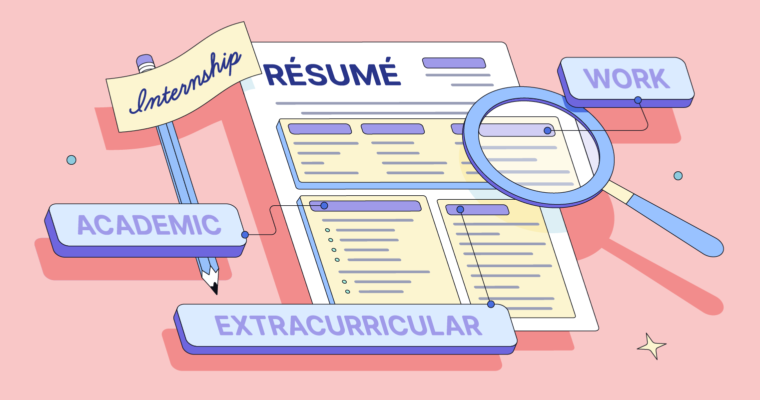
The average recruiter spends about six or seven seconds looking at your résumé, and you’ve got to make every one of them count. Do résumé objectives help or hurt you?
Objective statements—one- or two-sentence summaries that lay out your career goals—were once the standard. A decade ago, you wouldn’t have sent out a résumé without one. But times change, and what recruiters look for in a standard CV or résumé has changed, too.
In this piece, we’ll explain what a résumé objective is, when to use one, and when not to use one, as well as provide résumé objective examples for people looking to secure a new job.
What is a résumé objective?
A résumé objective is a short statement that outlines your short- and long-term career goals, why you’re seeking employment, your experience, and skills. It’s typically placed after the résumé header to grab a recruiter’s attention and give them a brief synopsis of your résumé.
Think of it as an elevator pitch. It should pique the recruiter’s attention and make them want to hear more, or—in this case—read through your résumé.
A résumé objective statement is one or two sentences. Avoid using objective statements from a template, as using customized ones will help set you apart from other candidates.
When should you include a résumé objective?
A résumé objective is a somewhat controversial choice because most younger recruiters find it old-fashioned and recommend against including it on your résumé. That said, objective statements are still useful when you’re making a major career change. An objective statement can explain why you’re making a switch and how your skills from your current position can translate into a different career, such as a salesman applying for a marketing role.
When moving to a new area
If you’re moving to a new area and want to apply for on-site roles, recruiters might disregard your application since your current address isn’t in their area. You can prevent that by including in your objective statement the month you plan on arriving in your new neighborhood.
If you have little or no relevant experience
Objective statements are also helpful for those with little or no experience seeking entry-level positions. These statements should explain your relevant experience, such as your major or extracurricular activities, and what you hope to accomplish in the role. Remember to lay out your objectives in greater detail in a cover letter.
When should you eliminate a résumé objective?
If you have experience in the role or industry
If you’re applying to a different role in the same industry or are seeking to advance your career, there’s no need to include a résumé objective statement. Recruiters and hiring managers are more likely to focus on your education and relevant experience than anything else on your résumé.
If you need the space on the page
If space is limited, it’s almost always safe to forego the objective statement and ensure your relevant work experience shines instead.
How to write a résumé objective
Your résumé objective is the first thing a recruiter and potential employer will see, so it’s important for it to make a good impression.
Read the job description
The first step in personalizing each résumé objective is to read the job description. This gives you an idea of what qualifications and attributes an employer is looking for in an employee, which you can use to change your objective statement as needed.
Make it concise
A résumé objective should be one or two sentences. Ideally, it should fit on one to three lines of your résumé. Conciseness prevents confusion and shows recruiters you know how to communicate effectively.
Customize it for each job
Take the time to tailor your objective statement for each specific job application. Yes, this takes a little time, but it shows the recruiter you’re passionate about the role and makes them more likely to take a deeper look at your résumé.
Use keywords
Using keywords in an objective statement serves two purposes: It shows the recruiter you read the job description, and it makes it more likely your résumé is seen. Most applications are sent through software that scans your résumé or CV for certain keywords selected by the employer. If they’re not found, your résumé may never be viewed by a person at all.
Your full résumé should also include these keywords, which may relate to your personality (collaborative), education or certifications (Master’s of Education, licensed mechanic), or experience with certain services (WordPress).
Include any relevant education or certifications
If the job posting is specific to a particular industry, be sure to include any relevant education or certifications. For example, someone applying for a job in the fitness industry would include in their objective statement that they’re a certified personal trainer.
Explain how you’ll benefit the company
It shouldn’t be all about you. Make sure to mention how your experience and goals will benefit the company.
Use action words
One study found that using action words in your résumé can increase your chances of an interview by up to 140 percent. Action words are verbs that explain what you’ve accomplished and give hiring managers an idea of your experience. Like the rest of your objective statement, these powerful résumé words can vary depending on the role. Someone applying to a manager-level position should use action words like coordinated and trained.
A résumé summary is another type of résumé introduction used to stand out in a crowded job field. A résumé summary is a short paragraph that speaks to how your experience makes you qualified for a particular job, whereas an objective statement is about your general experience and career goals. That said, the same tips for writing a résumé objective statement can be applied to résumé summaries.
Résumé objective examples
Remember that each résumé objective should be tailored to each job, so don’t copy and paste these objective statement examples. Use them as a guideline to create your own that speaks to your experience and goals.
- Student example: Journalism major and student newspaper editor seeking a news internship. Eager to grow my reporting and writing skills at the Queens Chronicle.
- Recent graduate example: Self-motivated recent graduate with a Civil Engineering degree seeking to create infrastructure for the city of Minneapolis.
- Geographic move example: Michelin star-winning chef moving to the Seattle area in June 2024. Crafted menus and led cooking lines at New York City restaurants.
- Career change example: Retail manager seeking to use interpersonal and leadership skills in a project manager role to help the company meet critical deadlines.
Résumé objective FAQs
What is a résumé objective?
A résumé objective is a one- or two-sentence summary at the top of your résumé that outlines your career experience and goals.
When is a résumé objective important to include?
Although they’re considered outdated by many recruiters, résumé objectives are important for people making career changes, recent graduates seeking to secure their first job, and people moving to a new area.
What are some tips for writing a résumé objective?
When you write a résumé objective statement, it’s important to keep it concise, customize it for each job application, use keywords included in the job description, include any relevant education or experience, and use action words to increase your chances of landing an interview.
Crafting a quality objective for your résumé doesn’t have to feel daunting. Grammarly’s AI résumé objective generator makes it easy to create a professional, personalized résumé objective in seconds.






